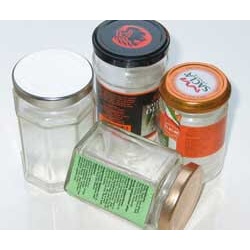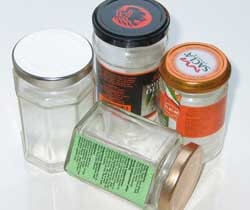
Yes, you CAN throw away glass containers!
Editor's note: Our story on Friday that Martin Enterprises of Decorah starting February 1st will no longer accept wine & liquor glass containers and a number of other glass beverage containers prompted several e-mails from readers:
Sam Zook wrote: Many people are hesitant to throw away their bottles, but they shouldn't be as worried about throwing away glass because it doesn't create methane in the landfill...People are still stubborn and put glass in the recycling bins, so I think it would be beneficial to let the people know this little fact. Also, when I took a tour of the recycling center, I learned how things operate and that everything can be recycled, but only happens if it is economically practical."
Winneshiek County Recycling Department Manager Terry Buenzow e-mailed: "In a controlled environment, glass can easily be recycled. Old bottles can be melted down quite easily into new ones many times over.
Outside of a controlled environment, the situation is much different. To recycle glass the purity of the old glass has to be 100 percent. Glass for beer bottles or pickle jars is much different than other forms of glass like window glass, baking dishes, etc. The various types are numerous, and are not compatible with each other even though they may look the same. Melting temperatures vary by hundreds if not thousands of degrees and the additives are different in each type. Because of this, adequate quality control is virtually impossible. One broken Pyrex baking dish or ceramic coffee cup in a 44,000 pound truckload of old bottles ruins the entire batch. It is not realistic to try to attempt this kind of quality control by picking out broken shards of the different glass types. Insurance loss-risk departments are not thrilled about glass sorting, either.
Viable markets for glass are almost non-existent. The glass manufacturing plants that do use recycled glass are few, and those that do exist have abundant supplies of nearby guaranteed pure material to use. Recycling is market driven and if multiple viable markets do not exist, recycling can not happen. To try to enter this very limited market is a guaranteed financial disaster. Recycling programs do not create the markets. They only supply them. The possibility of new markets for glass developing is close to zero.
Glass usage also has dropped dramatically over the past several years. It is heavy to transport and can not be manufactured where it will be filled with product. It has for the most settled out as a beer and wine packaging material, with a few exceptions. Those products generally do not taste as good when packaged in other materials. Canned beer does work very well, but canned wine does not. Glass also has major safety issues.
The Iowa redemption system does need some updating. The redemption centers are still working on the one cent per container margin that they did when it started in 1978. The value of the dollar has changed quite a bit since then. Another cent or two per container and some other updates that allow better operating efficiency are needed. The system does have a structure in place for getting the glass back to a central processing facility, but the material handling expense the redemption centers have with glass is still huge. It is far more efficient to handle aluminum cans and plastic bottles.
Our recycling program only accepts clear non-redeemable food container glass. We have to restrict it to that level to still stay within Iowa Code, which says that each county must provide for the recycling of cardboard, paper, plastic, metal and glass. How a law can say a market exists is questionable, but it is what it is. Rather than just cease all glass intake in open defiance of the law, we have no choice but to severely restrict it. It is the saddest subject in the recycling business. However, markets for the other materials are quite stable and abundant and there are major shortages of them worldwide.
If your glass does end up in the trash, it is not something that deserves a great amount of concern. It is now less than two percent of the total waste stream and that puts it in the fringe material category. It is inert and can not create any methane gas as organic material does in a landfill as it slowly decomposes. It is the equivalent of burying a rock. It would be easy to spend more money on trying to recycle glass than all of the other 98 percent of materials combined. If we focus our time and financial horsepower into keeping the other truly recyclable materials out of our landfill we will have much greater waste reduction results overall and provide better stewardship of everyone's money.
Site designed and maintained by Iroc Web Design Services©.
Your Small Business Web Design Solutions.™


